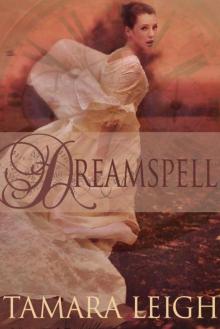- Home
- Tamara Leigh
LAWLESS: A Medieval Romance (AGE OF CONQUEST Book 7) Page 18
LAWLESS: A Medieval Romance (AGE OF CONQUEST Book 7) Read online
Page 18
“Aunt…” she drawled. “Only if my brother sired her, and that is unlikely. True, some babes come a month or more early, but very few a month late.” She raised her eyebrows. “This Theta knows, but as ever she has done, she makes use of others however she can.”
Vilda frowned. “You are here against your will?”
The woman turned, stretched out her legs, and leaned back on her hands. “As a purse of coin was put in my palm after being pried open by Theta’s lover, Ivo—whose name is as near the word evil as one can come—I am here as much of my free will as is possible for one who fears great protest will see her dead.”
“Then you do not wish to curse the resistance?”
“I do not, just as neither did I wish to curse the Normans as Theta first suggested.” She set her head to the side. “You know why I would not curse the invaders even had Hereward not refused, Alvilda?”
She hesitated, said, “Though you have my name, I do not have yours.”
“I am Herba, and ere you assume it is a foretelling of my facility with herbs, I was named for the Greek goddess of misery and poverty to commemorate that into which I was born fifty-five years ago—the suppression of our people when the Danish prince, Cnut, claimed England just as now the Normans take what does not belong to them.”
Vilda released her knees and, letting them fall to the sides beneath her skirts, winced over the clatter.
“Chains,” the woman said. “At least I escaped that—thus far.”
“Why would you not curse the Normans, Herba?”
“I confess to a shy belief in God, for which oft I apologize to my soul, though I know it is possible I speak only to myself bound to this earth rather than that which, should it prove only of the imagination, will never deliver me to a better place. I admit to even less faith in God’s representatives on earth, much of it lost when the pope blessed Le Bâtard’s quest for England. Aye, only a shy belief in God and a passing belief in His priests, but I am no witch as some believe, including Theta.”
“Why does she believe it of you?”
“Because I have worked what many name miracles when the bloodletting of physicians and prayers of priests fail to ease afflictions. Though I have made no such claim myself, there are those who do not like that one who lacks training in medicine and does not belong to a holy order—and is a woman—can do what they cannot. Thus, they warn away the faithful by accusing me of casting spells and curses.” She laughed softly. “Not that I do not bear some responsibility where curses are concerned.”
“How is that?”
Herba smiled, revealing though her teeth were gapped, most were present. “A physician came to me and, I vow, he cast the first curse. His jealousy over my ability to know which herbs to cultivate, mix, and cook angered me, but I said naught until he showed me his backside. And—oh!—’twas an ugly one for the large boil upon it.”
She drew in her legs and raised her hands as if to calm a stirring storm. “I know. I ought to have anchored my tongue rather than curse him as if I had the power to raise boils all over his body.” She sighed. “He carried tale of that throughout the Fens, showing that boil he said was but one of dozens I caused to appear on him. Not all believed him, but many who were happy to pay for my services shrank from me.” She spat on the ground. “A witch! I am no more that than he a man of healing.”
Vilda liked this woman Theta must have exposed to Taillebois during one of what was surely many meetings with the enemy—and of which Guy had likely known.
Though the anger of betrayal flared, Vilda put it out with the reminder that no matter how honorably he behaved—no matter the intimacy they shared—still they were enemies. Thus, he had not broken faith. Another had.
“Theta betrays the resistance,” she said.
Herba harrumphed. “Is it betrayal when one was never truly the side among whom they flit?”
“’Tis if they profess to be that side!”
The older woman wagged a finger. “If. Regardless, Theta can only betray one person—herself, since she is true to no other.” She jerked her head to the side. “Not unlike the duke who made himself king. Hence, why I thank the Lord no drop of my blood runs through her.”
“How many times since her arrival at Ely has she visited you, seeking to sell your curses to Saxons and Normans alike?”
“Several, though that first visit was for her—the cursing of both wife and sister of the Bloodlust Warrior of Hastings.”
Vilda stared as she traced that from Maxen Pendery who wed a Saxon through to Guy who was to have wed Elan. Why had Theta wanted his former betrothed cursed? Because that Norman lady wed a Saxon?
“And she expected me to do it without charge,” Herba continued. “When I declined, she slapped coin on the table. As my gruel was thinner than usual, I told her the deed would be done three successive nights.” She gave a grunt of laughter. “After she departed, I prayed for forgiveness of my lie, then for the well-being of those two ladies, though it was difficult to beseech the Lord to be kind to the Norman, Elan.”
“Why did she wish them cursed?”
“Rhiannyn because Maxen Pendery chose her and sent Theta away. As for Elan whom next Theta served, that lady turned her out to ensure her husband, Harwolfson, did not succumb to seduction.”
Recalling the more agreeable Theta after her feigned drowning, wondering what made such a woman, Vilda asked, “How did she come to be as she is?”
“If she has any excuse, it is that all knew my brother was gone too long from home—selling his wares across England—to sire Theta before he departed. As a child, she seemed oblivious to the whispers, but once she began growing into her beauty, she became aware what was discussed behind hands was not only about her mother when her jealous peers began speaking sly asides.” She sighed. “Tell someone often enough they are bad and their mind and body begin swaying to that tune.” A heavier sigh. “Would I could say I was innocent of what she became, but I could not bear to be around her mother, and since where the daughter was, usually the mother as well, I evaded both. Thus, Theta learned the greatest ease in life—and best revenge—was using her body to gain coin from the husbands and sons of those who wagged their tongues about her.”
Vilda did not want to sympathize with Theta, but she hurt for the girl she had been who saw no way forward but the way she had gone.
Silence fell until the flap was tossed back and two squires entered, one carrying a platter, the other a pallet.
Both looked dismissively at Vilda and warily at Herba.
Of a sudden, the older woman cackled, the sound so distant from the tone with which she conversed that Vilda caught her breath. “Ah, Norman boys,” Herba pitched her voice high. “Do the wee ones bring their elder an offering in the hope of keeping evil from them?”
They exchanged glances, then the one with the pallet tossed it at Vilda’s feet and said, “Viands and drink only, witch.” He motioned the younger one forward and that one set the platter on the ground and both quickly departed.
Once more in a pleasing tone, Herba said, “I know. But for the moment I am safe, and though I am glad of your company, I am bored, and in circumstances such as these, there is no better remedy than making the hairs of the enemy stand on end and little hearts beat fast.” She gestured at the platter. “Bring that here and together we shall ease thirst and hunger.”
With a loathsome sounding of chain, Vilda did as instructed. Though thirsty, she hungered little, which was not so for Herba who ate her portion and most of the rest, then pushed the platter away and wiped her fingers on her skirts.
“What will you do when you are called to curse your people?” Vilda asked.
“What I must to survive, just as done by those on the isle.”
“Then you will curse them.”
“When the Normans display me atop a tower, I will call down torment as it is believed I have the power to do.” In response to anger heating Vilda’s face, she said, “After all I have told, you judge m
e ill?”
Vilda leaned toward her. “I do not believe your curses possess unholy power, but they could strike crippling fear in the breasts of our people.”
“For that, my words shall be carefully chosen. Though to the Normans it will sound I am cursing the rebels on the isle, all I speak shall be for those at my back.”
“Still—”
“The Lord knows what is in my heart,” Herba spoke over her. “I can only pray Hereward and his followers know it as well.” When Vilda opened her mouth, she raised a staying hand. “I have neither the strength nor resolve to be a martyr. Have you, Alvilda?”
Did she? She wished it for the benefit of her people though she doubted any great sacrifice made by her would be of aid.
Herba patted her shoulder. “Night is not nearly nigh, but I am wearier for what is to come after, so I shall sleep, just as you ought to.”
Vilda tensed. “When will the Normans launch their next attack?”
“Taillebois’ aim is for the morrow, but I do not know how good that aim. Now gain your rest.”
Vilda retrieved the platter, crossed to the flap and eased it back. As she set the platter on the ground outside, she saw three guards at the front and sides, just as they saw her. And she did not doubt there was one at the back. Herba and she were going nowhere.
Chapter Eighteen
Pagan, that was what William had named this when Ivo proposed it, and yet the king had agreed—just as he concurred not even three days was needed before the next attack. One additional day only, and as some of it was wasted on this, once more Guy’s control threatened to mutiny.
The only lightness to be had was the so-called witch looked no witch at all, nor did she appear eager to perform for those who watched openly and those who observed amid shadows, William among the latter as if to ensure he could claim he had not sanctioned this should he be called to account later.
“Accursed Taillebois,” Maxen had muttered before excusing himself by telling that the warriors who had replaced the dead were in need of more supervised practice. Had not Vilda accompanied the caster of curses and spells, Guy would have given a similar excuse and departed. And had he not hoped his presence would offer her some reassurance, he might have accepted William’s invitation to watch from the copse.
“Your king awaits, Herba!” Ivo called when the woman standing before the springs remained absorbed in whatever she sought to demonstrate. Though expected to jump to a Norman’s command, she reacted in no way to evidence she heard—unlike Vilda who stood beside Taillebois.
She glared at the knave, then moved that glare to Guy who stood five removed from her in the midst of others of the war council. It bothered she looked upon him thus, but as she had reminded him after their shared intimacy, they were enemies, and greater evidence of that now she was held at this place from which Guy and others would lead an attack against her own. And yet before she snatched her gaze away, he thought he saw softening there as if for him it was a show of abhorrence rather than true feeling.
Even so, all changes on the morrow, he knew. And more greatly if the resistance is crushed. If…
“What say you, Watchman?” Herba blurted in Anglo-Saxon, causing Taillebois and others of the council to stir and some to murmur. Then the woman dropped to her haunches and leaned forward as if to converse with one whose head had emerged from the water. “I know, I know. It abounds, but not in me, I vow. Not in me, Watchman.”
“What goes, Lady?” Ivo growled.
Knowing it was pretense, Vilda pressed her lips to keep from smiling. The morning meal having been delivered with the message Taillebois required a demonstration of Herba’s powers, the woman had thought on it as she chewed through bread, concluded the show demanded of her was for Le Bâtard, and offered assurance she was sly enough to satisfy.
“I know,” Herba said entreatingly, then groaned. “Aye, most troubling this.”
“Lady, what does she?” the knave spat in Vilda’s ear.
She looked into a face so near she could see its every pore. “You need me to translate?”
“Non! I have suffered the muck of your language long enough to understand it. To whom does she speak?”
She blinked. “How can I know? As a Christian, to no end would I converse with whatever she has summoned, nor would I employ any other to do it for me.” She shuddered. “I fear the wrath of God.”
His face darkened, and regret flew through her at the realization he might strike her though she was the king’s prisoner. Whether or not he would have dared, she could not know—much gratitude to Herba.
“Calm thyself!” The woman jerked as if a hand pulled her toward the water. “I know what is required of me!” She went very still, then tilted her head as if listening closely. “Agreed and agreed. As you will do, so shall I.” She stood and turned to those who watched, some of whom Vilda was certain were in the trees, among them the usurper.
No bend to shoulders nor back as expected of a crone, Herba advanced. “Though the guardian spirit of the springs threatened to slay me, I soothed it. It shall cost me much, but it agrees to intercede, ensuring no more good and noble lives are lost to the river when next you seek to cross to Ely.”
“That is proof of your power?” Taillebois demanded as she halted before him. “Words spoken to air? Naught to show for it?”
Herba closed one hand over the other and pressed them to her chest. “My Norman lord, you err if you think spells can be seen in the moment like fire molded in the hands and sparks flying from fingers. The field must be prepared to receive the seeds, and the seeds sown. Now that both are done, when your forces are ready to cross from this side to that, they shall do so without hindrance.”
From this side to that, Vilda mused. Clever words, true whether the enemy safely crossed to the isle or from life into death.
“Your survival depends on it,” Taillebois snarled. “Come!” He turned toward the camp.
Vilda hung back until those of the war council followed and the older woman drew alongside. Gaze fixed on Guy ahead, she murmured, “Quite the performance, Herba.”
“For fools,” the woman rasped. “Had Hereward witnessed it, he would have scorned me at best, drowned me at worst.”
Vilda agreed. For that, her cousin had rejected Theta’s proposal he employ Herba. He had some of the heathen about him, but he was Christian enough not to offend the Lord.
As they passed the copse where Vilda was certain the usurper had lurked, the guards who had delivered them here pushed off trees and fell in behind. Thus, no more was spoken between the women as they traversed the path, during which Vilda focused her attention on the chevalier ahead and wished she could speak with him though she did not know what she would say.
Surprisingly, once they entered the camp and were moving among workshops where iron and wood were fashioned into deadly implements and the din of those sounds and the voices of many assaulted the ears, he halted and resumed his stride when she drew even.
“Vilda,” he said.
It would be better had he forgotten her invitation to be familiar, and yet hearing him speak her name was honey to a bitter heart.
Lord, help me not feel so much, she sent heavenward. No good can come of this. She met his gaze. “Guy.”
He looked past her, and when he acknowledged the other woman, Vilda saw no disdain nor disquiet about him.
“Chevalier,” Herba returned his greeting and said, “Either you are ill-mannered in being familiar with this Saxon lady, else you are an agreeable acquaintance.”
Before Guy could respond, Vilda gave answer. “This chevalier saved me from drowning and has been as much a protector as ’tis possible for a Norman. That kindness has been a balm to the unkindness of being his king’s captive.”
The woman grunted. “And yet this witch sees more than that.”
Ignoring that, Guy said, “As I would speak with the lady in private, the guards will return you to your tent.”
“As I said,” Herba mutte
red and lengthened her stride as Guy took Vilda’s arm and led her into the shade of a covered well clear of bustling activity.
When he released her, she said, “I listen.”
“You look well, Lady.”
Having no mirror to confirm that, she glanced down the layered gown and tunic that had been laundered the day before she departed Brampton. “I thank you.”
“You were treated civilly during the remainder of your stay at the manor?”
Hardly a stay, she thought. But it had been soft imprisonment. “I was, though I wearied of chess matches with your king—only two of which he won, I am pleased to say.”
“It is good you held his interest.” He glanced at where Herba had gone from sight. “All is well between you and that woman?”
“It is. And that she is here to curse her people as it was proposed to the resistance she curse Normans, now I know what I believe you knew all along.”
“That you should beware of Theta,” he said. “Aye, she is Taillebois’ pet. Hopefully, you will not think too ill of this enemy for not revealing an asset of my king.”
“I considered it, but I accept that since ever we shall be different sides, it is wrong to begrudge you your secrets, just as it is wrong to begrudge me mine. But I do wish…”
“What?”
She averted her gaze. She had nearly expressed the longing to get word to Hereward of the betrayer lurking around the edges of him, but that was impossible.
A moment later, the impossible became distantly possible when she swept her gaze past a table where laborers waited for water cups to be filled from large clay pots. One of those standing at the back of a line raised a hand low, and the feeling it spoke to her caused her to look again.
The hood of a frayed mantle draping his head, he of darkly smudged face stared. And she knew what the furrowed brow asked of her—For what are you here, V?
“Vilda?”
She returned her regard to Guy and, silently acknowledging she had another secret he could not begrudge her, covered agitation over the danger in which Hereward placed himself by arching her eyebrows questioningly.

 FEARLESS: Book Two: Age of Conquest
FEARLESS: Book Two: Age of Conquest BOUNDLESS: A Medieval Romance (AGE OF CONQUEST Book 6)
BOUNDLESS: A Medieval Romance (AGE OF CONQUEST Book 6) Lady Betrayed
Lady Betrayed Merciless
Merciless Nowhere, Carolina
Nowhere, Carolina Virgin Bride
Virgin Bride Blackheart
Blackheart Restless in Carolina
Restless in Carolina THE AWAKENING_A Medieval Romance
THE AWAKENING_A Medieval Romance Baron of Blackwood
Baron of Blackwood Leaving Carolina
Leaving Carolina HEARTLESS: A Medieval Romance (Age of Conquest Book 4)
HEARTLESS: A Medieval Romance (Age of Conquest Book 4) Baron of Godsmere
Baron of Godsmere Lady Of Eve
Lady Of Eve LAWLESS: A Medieval Romance (AGE OF CONQUEST Book 7)
LAWLESS: A Medieval Romance (AGE OF CONQUEST Book 7) Lady Of Fire AKA Pagan Bride
Lady Of Fire AKA Pagan Bride The Yielding (Age of Faith)
The Yielding (Age of Faith) The Redeeming: Book Three (Age of Faith)
The Redeeming: Book Three (Age of Faith) LADY UNDAUNTED: A Medieval Romance
LADY UNDAUNTED: A Medieval Romance THE RAVELING: A Medieval Romance (Age of Faith Book 8)
THE RAVELING: A Medieval Romance (Age of Faith Book 8) LADY EVER AFTER: A Medieval Time Travel Romance (Beyond Time Book 2)
LADY EVER AFTER: A Medieval Time Travel Romance (Beyond Time Book 2) Dreamspell
Dreamspell The Unveiling (Age of Faith)
The Unveiling (Age of Faith) THE RAVELING
THE RAVELING Splitting Harriet
Splitting Harriet Age of Faith 4 - The Kindling
Age of Faith 4 - The Kindling THE RAVELING_A Medieval Romance
THE RAVELING_A Medieval Romance Perfecting Kate
Perfecting Kate Misbegotten
Misbegotten THE VEXING: A Medieval Romance (AGE OF FAITH Book 6)
THE VEXING: A Medieval Romance (AGE OF FAITH Book 6) LadyOfConquest:SaxonBride
LadyOfConquest:SaxonBride